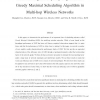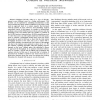163 search results - page 15 / 33 » How Optimal are Wireless Scheduling Protocols |
EWSN
2009
Springer
14 years 9 months ago
2009
Springer
Abstract. In their EWSN'07 paper [1], Giusti et al. proposed a decentralized wake-up scattering algorithm for temporally spreading the intervals in which the nodes of a wirele...
INFOCOM
2008
IEEE
14 years 2 months ago
2008
IEEE
In this paper, we characterize the performance of an important class of scheduling schemes, called Greedy Maximal Scheduling (GMS), for multi-hop wireless networks. While a lower ...
INFOCOM
2003
IEEE
14 years 1 months ago
2003
IEEE
— Multiuser diversity refers to a type of diversity present across different users in a fading environment. This diversity can be exploited by scheduling transmissions so that us...
TMC
2012
11 years 10 months ago
2012
WiFi interface is known to be a primary energy consumer in mobile devices, and idle listening (IL) is the dominant source of energy consumption in WiFi. Most existing protocols, s...
MOBICOM
2009
ACM
14 years 2 months ago
2009
ACM
Modern wireless interfaces support a physical layer capability called Message in Message (MIM). Briefly, MIM allows a receiver to disengage from an ongoing reception, and engage ...


